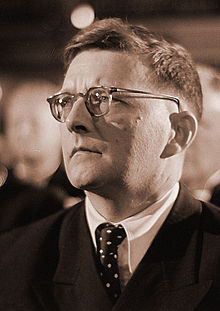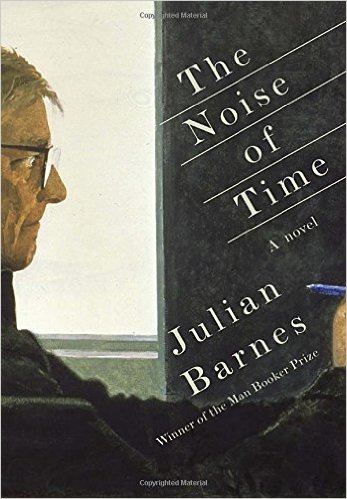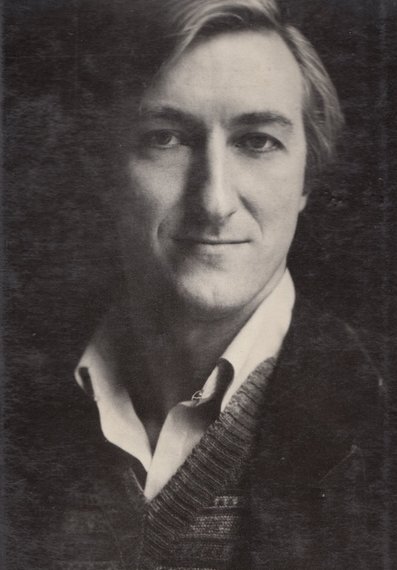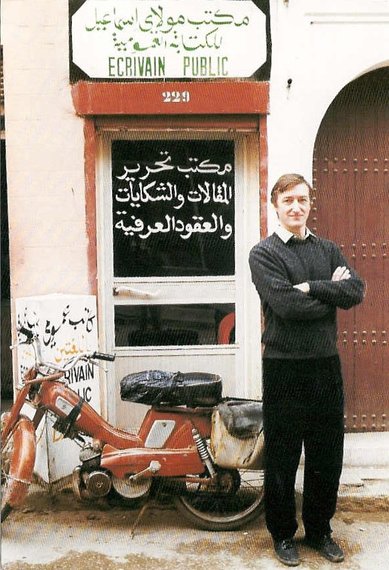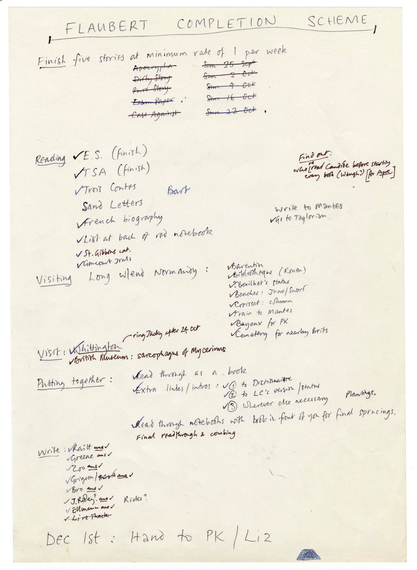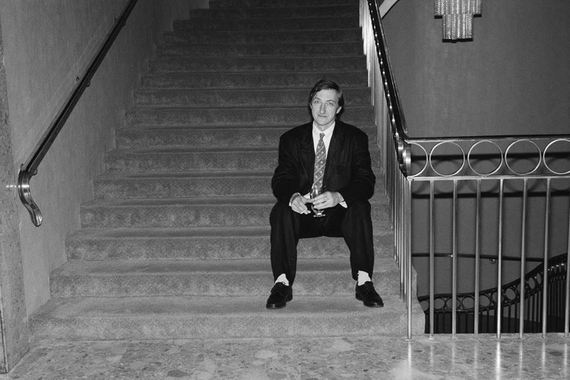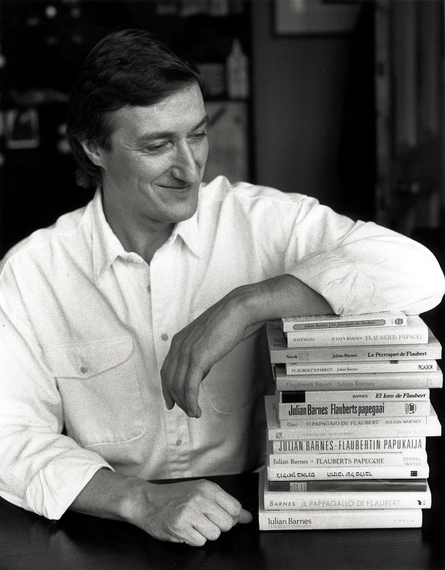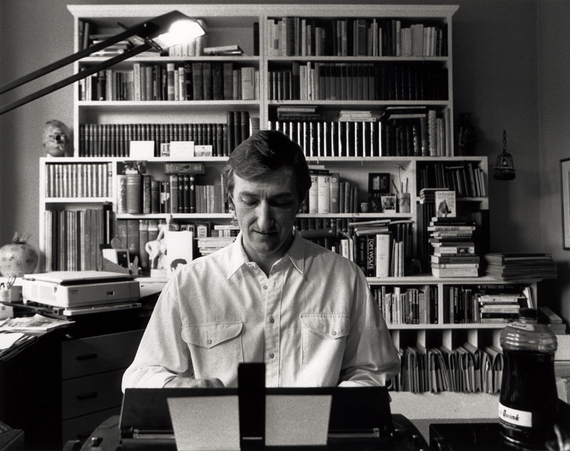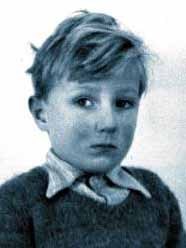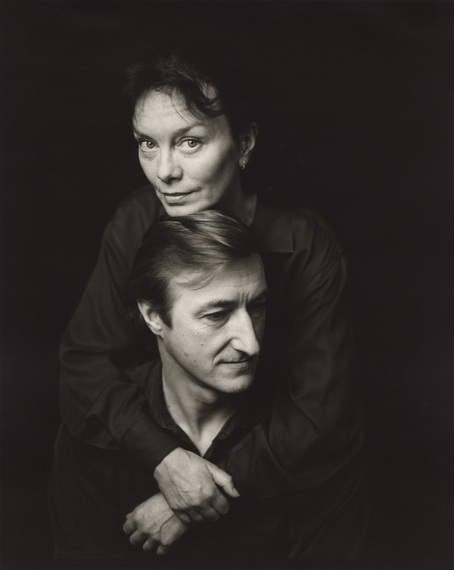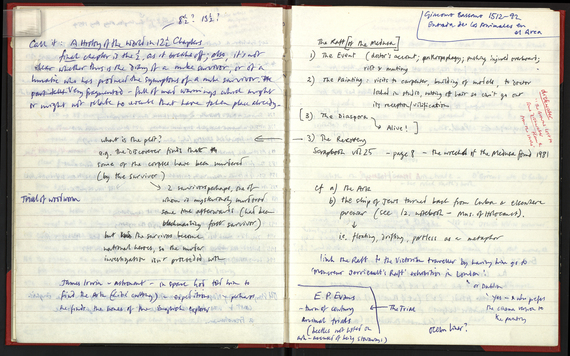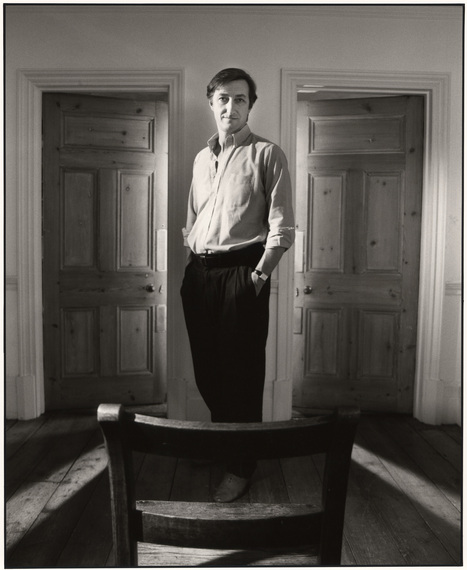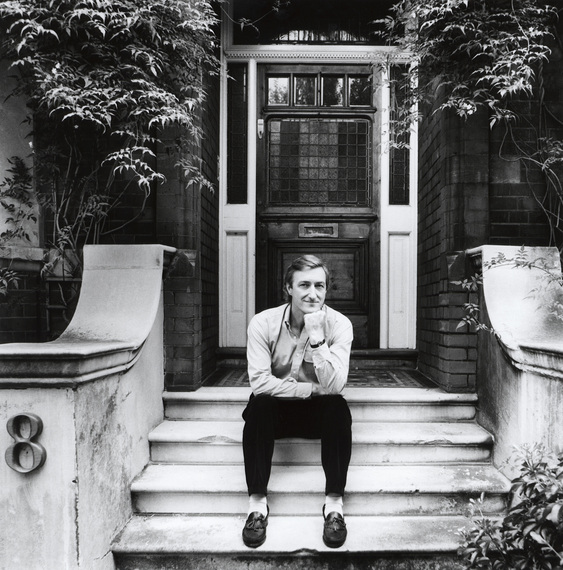Julian Barnes Jori Klein/New York Public Library
Acclaimed English author Julian Barnes meets me in the lobby of his hotel for a late TGIF tea. He's been on the road for weeks (Boston, Toronto, Australia, Palo Alto) promoting his new novel, The Noise of Time, and is dressed down in what could pass for jeans and an open collar shirt--an outfit he might imagine suits Huffpost American readers. I in turn have dressed in my most ladylike attire (shirtwaist dress, kitten heels, Ascot-worthy chapeau) as I had seen him speak at the New York Public Library a few nights earlier in a pin stripe suit (granted, no tie, as above) and wanted to make a good impression on this most elegant, erudite polymath whose latest book of 20 inhabits the tormented mind and perils of 20th century Russian composer Dmitri Shostakovich. This cross-dressing seems to me the perfect irony, a quality Barnes deems essential in many of his novels and essays. "All his life he had relied on irony," muses Barnes via Shostakovich, "in the gap between how we imagine, or suppose, or hope life will turn out, and the way it actually does."
Dmitri Shostakovich in 1950
"Irony is the singular defense of the self and the soul, it lets you breathe on a day to day basis" Barnes has also said. "I won't give up my irony. Not for anything," he insists with relish.
I am secretly very pleased Barnes has consented to speak with me as he mostly appears in the pages of The Guardian, the London and New York Reviews of Books and the New Yorker and the New York Times--and I want to believe that the Huffington Post audience is open to reading and learning about him and catching up with one of the most incisive and dynamic contemporary authors.
The Noise of Time The music of Shostakovich has served as inspiration for other artists like William Kentridge and Alexei Ratmansky. But Barnes lets us eavesdrop on Shostakovich's obsessive, paranoid thoughts as he confronts Stalin and his minions. "This is a story about crushing the spirit of a man, where art and power collide," says Barnes. It asks the questions, What is the role of the artist in society? What are his/her responsibilities? How far should one go in defending against tyranny? How hard is it to bite the hand that feeds? How is personal honesty connected to artistic honesty? Do you have to make a pact with the devil to follow your passions?
This novel strikes me as the perfect antidote to our commercial contemporary art world. "The Art market has some justice to it because it does seem to be a place where the ignorant super rich are deprived of their money for baubles," says Barnes with some mischief.
Cover photo on Metroland, Barnes first novel, by Jerry Bauer
Barnes expanded the definition of "writer" before it was fashionable to do so. Like a performance artist, he is multi-disciplinary, applying his considerable intelligence to essays on art (Keeping an Eye Open,) Leicester City Football, classical music, love (History of the World in 10 1/2 Chapters), memory, friendship, the ties that bind and those that fray (The Sense of an Ending which won the Man Booker Prize in 2011) and death (Levels of Life).
Julian Barnes in Morocco, photo by Pat Kavanagh 1998 courtesy Harry Ransom Center
Each book presented a different technical challenge for Barnes--and does for the reader--as he never repeats himself, though the themes of love/death/betrayal/memory/irony/truth do populate most of his work.
Julian Barnes Completion Scheme for Flaubert's Parrot, courtesy Harry Ransom Center
Is he famous? Well, that depends. A 21-year-old NYU creative writing major I sat next to at the NYPL who was there on assignment had "heard of him" but "hadn't read anything". (I recommended to her, and to you, if you haven't read Barnes yet--she start with The Sense of an Ending and work her way backwards and forwards.) But says Barnes, when he attended a recent Leicester City match, " a 15 year old spotty kid with three others pointed at me (and here, Barnes slips into an accent which sounds to an American ear just like Eliza Doolittle)--"Oi, I know that face; I know that fucking face!"
That face is lean and chiseled, his 70 years resting lightly on his neck which sometimes has a birdlike quality--a bit like the parrot of Flaubert which launched his career, listening carefully and able to imitate.
Flaubert's Parrot, Julian Barnes' breakthrough novel
But Barnes does not think of himself as a lit star like Tolstoy in his later years, or Bernard Shaw.
Julian Barnes by Sam Kanga, Toronto, 1991
"Those people sit on a high stool; they talk down to their readers. My image of me and my reader has always been this: we're sitting side by side, we're not sitting opposite one another; at maybe a café table looking out across the street and I'm saying, 'What do you think those two are up to?' what's your guess, this is what I think might be happening; it's a collaborative process; were sitting at the same level; of course I'm in charge, I run the game; but I imagine a sort of complicity with the reader; as if the reader might be saying, 'yeah, I can see that, they might not really be quarrelling, that might just be their way of getting on'".
Julian Barnes at desk with translations of Flaubert's Parrot, courtesy Harry Ransom Center
In The Noise of Time he goes one further, putting himself inside the mind of a man who "was perhaps the most persecuted composer ever" in three defining moments of a fraught battle with Power in order to make his music: first, as Shostakovich anticipates arrest by his elevator landing, second, on the plane back to Russia after a Cultural and Scientific Congress for World Peace in New York where he has delivered a force-fed speech decrying his beloved fellow composers Stravinsky and Prokofiev and third, in the back of a car after being summoned by a party official to tell him of his appointment to lead the composers federation.
Many reviews of the book have quibbled with the verisimilitude and the "real" biography of Shostakovich. This seems to me an old, tired trope as I believe that a novelist (or filmmaker, or artist) should not have to account for the "facts" except in so far as they serve the story. Barnes says history and biography are not "higher" disciplines than fiction but-- tongue firmly in cheek--that, "they all annoy each other...for the time most readers are reading, they'll think it's the truth. That's what fiction does." These disciplines may elbow each other for our attention but learning from Barnes is an excellent way to begin learning about an historical figure. "History is a raw onion sandwich--it just repeats, " a phrase he also has used more than once.
Learning about Barnes by reading Barnes is a more complicated task. He says, "in most of my books I don't want to be there." Yet one can't help but try to connect the dots.
Julian Barnes at his desk, courtesy Harry Ransom Center
Was he the brilliant young student Adrian from The Sense of an Ending? The impish young Shostakovich who knows his mother reads his diary and so cleverly plants two entries, "Suicide?" and "Marriage"? "I'm just observing-life clever," says Barnes, "I think I'm in charge of my story."Yet he himself has written in Keeping an Eye Open: "Once we know something about an artist we can't unknow it."
Julian Barnes as a young boy
Barnes was born into a middle class family of schoolteachers in Leicester. He went to private day school and then to Oxford and worked as a lexicographer. After two novels, he broke through to fame with Flaubert's Parrot, and has been prolific and honored around the world ever since (he is translated into forty languages). He was not able to be in charge of his own story when it was tragically interrupted by the death of his wife, the much-respected and admired literary agent Pat Kavanagh after a brain tumor was diagnosed in 2008.
Julian Barnes and his wife Pat Kavanagh, portrait by Jillian Edelstein, 1991
He wrote with great emotion but revealing precision about what that death meant in Levels of Life--of his suicidal thoughts, his abject despair, the nature of love and long-term attachment. But he says, he has rebounded, even though "she's probably my first reader while I'm writing" and that he still dedicates each book to her. "I'm now 7.5 years into it; I'm out in the world and I can go out on a book tour; at first I didn't want to be looked at; I didn't want to be interviewed or talk to anyone about books. You don't go back to the way you were before."
Barnes turned 70 just nine days before this new novel was published in England, a day he picked because it was an important Shostakovich anniversary. Then, he was supposed to be giving himself an easy year. Instead he finds himself in demand and on the road since he has not toured for quite some time.
Julian Barnes notes for The History of the World in 10 1/2 Chapters, courtesy Harry Ransom Center
In the last six years Barnes has written six books so there are a lot of questions. He writes all day in his London study but looks forward to going out at night to football matches, to classical concerts, to the theater or just cooking for friends. Does he follow any popular culture? He still has his old record collection of pop music. Is he online? " I very rarely write anything just to be online, I like working at it and working at it and then seeing it in print...I sometimes devote two hours of my day to reading the Guardian." He doesn't have a mobile phone. "I got an IPad about three months ago; I love it, I think it's fantastic." And he adds more tellingly, "it's a hedge against hotel sadness."
He does go to see contemporary art but, "before I write about an artist (as in Keeping an Eye Open) I like them [artists] to be dead preferably because then I can see their whole oeuvre and I like to look at them over a long period of time." When I press him for names of living artists he offers Rachel Whiteread , "she's a very interesting artist and I want to see what she continues to do". But he, "despairs of what's become of Damian Hirst, for example after a rather brilliant beginning--and then it becomes about money and brand." "At a certain point Picasso began painting Picassos and Braque continued to paint paintings," Barnes says and he quotes Braque (an essay subject), "Picasso used to be a great painter and now he's just a genius".
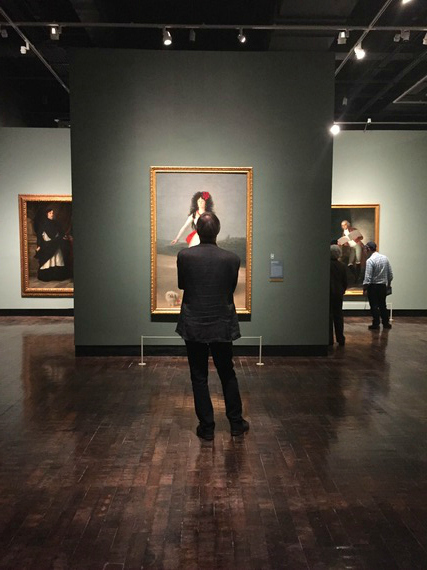
Julian Barnes by Ryan Roberts, 2016
"This was often the way it was with artists: either they succumbed to vanity thinking themselves greater than they were, or else to disappointment, "elaborates Shostakovich.
He is out of mourning by way of another departure, co-curating an exhibition at the Royal Academy (2018) on the Nabis-school Félix Vallotton (another essay subject). "It's very exciting to do something in a completely different art," he allows. He is at odds with the notion that the "gold medalist" is the only one worth remembering.
Julian Barnes by Miriam Reik, 1980's courtesy National Portrait Gallery, London
"I don't think I'm a snob - if by snob we mean someone who looks down on their supposed social inferiors. If anything, I'm the opposite - I look down (a little) on my supposed social superiors. My implicit attitude to someone very rich or posh is: go on, then, you impress me." He is not on the charity circuit but instead is a longtime trustee of the Freedom from Torture foundation which provides medical, psychological and social help to immigrants to Britain who have been tortured in their countries of origin.
Shostakovich wasn't physically tortured though the opening image of him sleepless, waiting by his elevator fully dressed with a suitcase night after night so that his family is not disturbed when he is shipped off to a camp provides waterboarding all its own. Barnes says Putin is not in the same league as Stalin. "One of the tests of tyranny is whether you're allowed to leave the country." He is adamant about Britain not leaving the EU and thinks, "to have the first Muslim mayor [London, Sadiq Khan] in a Western Country is brilliant, especially since he defeated a candidate who behaved badly, who played the race card."
Julian Barnes by Stephen Hyde, courtesy National Portrait Gallery, London
Though Barnes is a master at utilizing the pithy quote of artists he admires I must pay homage to his own mastery of the apt phrase, some selections below:
Destiny. It was just a grand term for something you could do nothing about. When life said to you, And so, you nodded and called it destiny.
We expect too much of the future hoping it will quarrel with the present.
A beautiful woman grows old: She sees only what has gone; others see only what remains.
He swam in honors like a shrimp in shrimp-cocktail sauce.
What use after all is a conscience unless, like a tongue probing teeth for cavities it seeks out areas of weakness, duplicity, cowardice, self-deception.
It was as if in drawing up their plans for Soviet Russia the architects had been thoughtful, meticulous and well intentioned but had failed at a very basic level: they had mistaken metres for centimeters and sometimes the other way round.
So, your talent lies beneath you like a swathe of peat. How much have you cut? How much remains uncut?
Art doesn't just capture and convey the excitement the thrill of life, sometimes... It is that thrill.
A composer was expected to increase his output just as a coal miner was, and his music was expected to warm hearts just as a miners coal warmed bodies.
If you turned your back on irony, it curdled into sarcasm. And what good was it then? Sarcasm was irony which had lost its soul.
We are all lost at sea, washed between hope and despair, hailing something that may never come to our rescue.
Most people didn't experience the '60s until the '70s.
And my absolute favorite:
"Love is just a system for getting people to call you darling after sex."
In light of the repressive regimes blooming all over the world and the uneasy notion that suppression of alternative thinking is the only way forward for artists and writers, I confess I share a fantasy with Shostakovich, that all the arts might "finally come together in one glorious joint project....not just reflecting society or criticizing it....but making it....artists, without any political direction, would help their fellow human souls develop and flourish" and not end with a man standing by a lift waiting to be taken away.
"Art belongs to everybody and nobody. Art belongs to all time and no time. Art belongs to those who create it and those who savour it. Art no more belongs to the People and Party than it once belonged to the aristocracy and the patron. Art is the whisper of history, heard above the noise of time,"writes Barnes. "Art outlasts history and biography," Barnes adds at the NYPL. "Do we remember the archduke who employed Mozart?"
"Every so often we need the aesthetic of a cataract operation to remind us not to take things for granted to re-alert our sensibilities," writes Barnes. Barnes is the writer/surgeon who can help.
This interview has been edited and condensed
The Noise of Time and other Julian Barnes titles are available here and at your public library.
I recommend The Noise of Time as ideal for any father interested in political history or art for Father's Day
The Harry Ransom Center at The University of Texas at Austin holds Barnes's papers. The National Portrait Gallery also has a collection of Barnes images which you can find here.


